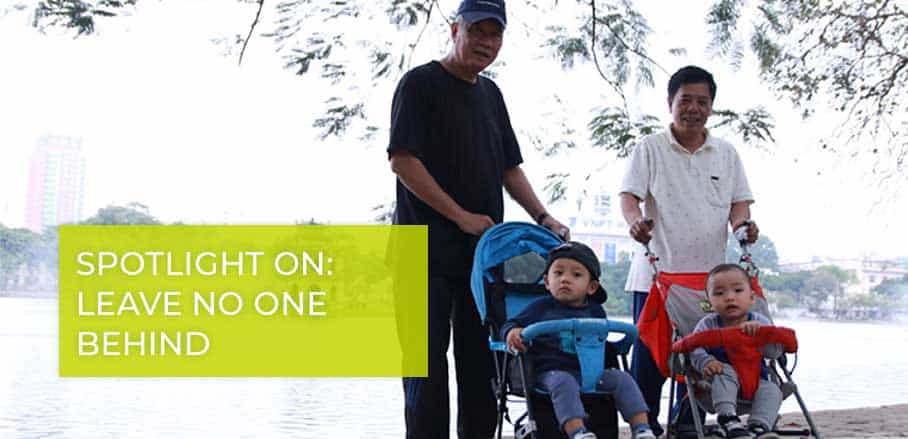Sustainable Cities for All – How Can SDGs Contribute?
Migrant workers in cities often experience exclusion and discrimination. Hoang Phuong Thao explains the particular situation of women migrant workers in Vietnam, and why SDG implementation is a great tool for integrating disadvantaged groups into the urban development process.
“I have to wake up at 4:30 am every day, 7 days a week to prepare breakfast for my parents-in-law and my little 2-year-old daughter. My husband works in a different city and he only visits us during the Tet holiday. There are no kindergartens that I can send my daughter to, as we are migrants to Hanoi and don’t have official residency here. I do not mind for myself, but I am worried about my daughter and in-laws.” (Ms. Xuan (name changed), 28 years old, migrated to Hanoi from Thai Binh Province to work in a sweatshop for a salary of VND 7 Mil (EUR 220) a month.)
Urbanisation in Vietnam has been accelerating at an unprecedented pace. In 2018, the size of the urban population was 2.9 times bigger than in 1980 and is expected to increase by about 1.36 times by 2030. Yet, Vietnamese cities still suffer from a lack of practical criteria to guide urban development to the expectations of their residents, particularly in terms of infrastructure and services, security and safety, and employment conditions.
Gaps in Urban Planning
Infrastructure and public services to accommodate the growing population are major issues in Vietnamese cities. They are neither accessible nor affordable enough for the citizens of urban areas. 80 per cent of women migrants like Ms. Xuan in Hanoi or Ho Chi Minh City live in one-story shelters or temporary houses with poor living and sanitary conditions, according to a study by ActionAid Vietnam. There are no waste classification and recycling systems in place. Inadequate sanitation, irregular and polluted water, and low-quality drainage systems require people to pay out of pocket for maintenance and are gravely affecting their well-being.
Moreover, policy makers in urban planning in Vietnam have limited understanding of safety issues. Research by ActionAid Vietnam reveals that 87 per cent of women and girls in Vietnam have experienced sexual assault in public areas. The lack of street lighting and inappropriate light timing is among the top three causes of feelings of insecurity for 60 per cent of surveyed women.

Young women campaigning for safer cities. © ActionAid Vietnam
Urban areas attract a great number of migrant workers who seek job opportunities. Among them, women migrants are particularly affected by dire working conditions and a lack of supporting services. ActionAid Vietnam’s studies have revealed that the income of women migrants in informal employment is very unstable, with a range from VND 3 to 5 million per month (equivalent to USD120 – 200). More than 94 per cent of surveyed informal women workers did not have any health care, social insurance or any other social protection.
Moreover, women migrants with small children like Ms. Xuan do not have access to public kindergartens, which require formal residency or are not available at all in some localities.
These conditions demonstrate how the current urban structures in Vietnam are failing to include disadvantaged groups who are living and working in these cities and make them thrive. Should urbanisation continue in this direction, a large proportion of the cities’ population will be left behind and excluded from the benefits of the development to which they make a significant contribution.
The SDGs as a Framework for Sustainable Urban Development
The SDGs offer a structured and comprehensive framework for nations and regions to plan and build urban areas in a way that makes them safe and sustainable. This framework examines all aspects of urban life and ensures that cities are inclusive and considerate of life quality of vulnerable groups, particularly the urban poor, women, and migrant workers.
In 2018, Vietnam presented the Voluntary National Review (VNR) on SDG implementation at the United Nations’ High-Level Political Forum for the first time. Regarding urban development, this VNR reports on the general urban population yet fails to reflect the particular situation of informal women workers and their children. For instance, the report mentions that by mid-2017, more than 80 per cent of urban residents had access to domestic water supplied by the concentrated system. But it does not mention that migrant families in rented houses often experience water shortage during dry seasons. Overall, the report fails to highlight how significantly migrant women workers are deprived of economic power, social rights and participation, as illustrated by Ms. Xuan’s account above.
In this context, ActionAid Vietnam’s research has built a solid ground for the argument to use the SDGs as a measurement of inclusive and sustainable development. It has made migrant women and their overlooked roles and contributions visible to society, policy makers, and relevant stakeholders. Unlike information collected and consolidated by governmental agencies, ActionAid Vietnam’s studies report people-generated data, voicing their actual issues and needs. Being the very first of civil society’s contributions to be officially recognised, it is an important step in advocating for the just and rightful integration of disadvantaged groups into the urban development process – in short, to not leave them behind.
Nations across the globe share the responsibility for a sustainable status of the world’s development by 2030. However, the SDGs, their indicators, and methods to collect data and draw conclusions from it vary from country to country. In Vietnam, civil society organisations are demanding that the government finalises and applies the nation’s SDG indicators to systematically plan and implement its development strategies. Only by integrating SDG indicators into the development process and allowing them to navigate our journey will we realise the goals we committed to, while we make sure to leave no one behind.
The author would like to thank Nguyen Phuong Thuy, Vu Hong Trang and Dinh Hoang Giang for their contributions to this article.
- Sustainable Cities for All – How Can SDGs Contribute? - 25. July 2019
